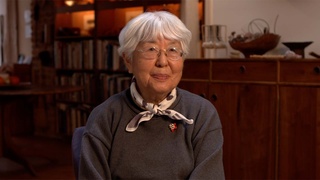Interviews
Prom during the war
I was sophomore when the war broke out. All of the sophomores, we had hardly any social life. Our first junior prom that we had, we were… We had our prom in our cafeteria. We had moved all of our tables off to the side. And the cafeteria there was a very old cafeteria. The floor was very worn, so you know, it wasn’t very smooth—lumps along the lumber there. But we tried to darken the room as best as we can, and that was our junior prom.
I recall our senior prom. We still had curfew, we still had to be off the street by 6 o’clock. And we went to the Mormon Tabernacle on Beretania Street. And we pulled all of the drapes so that it was completely dark and a very dim light. And our senior prom was from 1 o’clock to 3:30.
And so, that’s the kind of social life that we had. We didn’t have very much activities going on. And so a lot of us, our friends that got together and we’d spend time together from one friend's house to another friend's house on weekends. So we developed a closeness among some of the friends that we had in high school.
Date: December 15, 2003
Location: Hawai`i, US
Interviewer: Art Hansen
Contributed by: Watase Media Arts Center, Japanese American National Museum.
Explore More Videos

The Dopey bank that survived the war
(b. 1934) Award-winning Disney animation artist who was incarcerated at Topaz during WWII

Evacuated to the Jungle
(b. 1938) Philipines-born hikiagesha who later migrated to the United States.

Captured by Guerillas after bombing of Pearl Harbor
(b. 1938) Philipines-born hikiagesha who later migrated to the United States.

Grandfather picked up by US Army
(b. 1952) Former banking executive, born in Hawaii

Father's business partner operated their farming business during WWII
(b. 1935) Sansei businessman.

Father was convinced the constitution would protect him
(b. 1935) Sansei businessman.

The lack of discussion about family’s incarceration in Amache
Sansei judge for the Superior Court of Los Angeles County in California


Her brother’s reasons as a No-No Boy
(b. 1923) Japanese American poet, activist

Her grandfather was pressured to teach Japanese
Sansei judge on the Superior Court of Los Angeles County in California

Neighbor took care of her mother after grandfather was taken by FBI
Sansei judge on the Superior Court of Los Angeles County in California

Immediately after the bombing
(b. 1938) Japanese American. Hiroshima atomic bomb survivor

Other family members not as lucky
(b. 1938) Japanese American. Hiroshima atomic bomb survivor

His parents had little hope that he had survived the atomic bomb
(b. 1938) Japanese American. Hiroshima atomic bomb survivor

His views on nuclear weapons
(b. 1938) Japanese American. Hiroshima atomic bomb survivor
